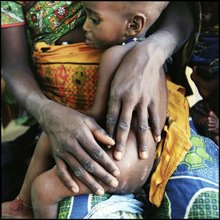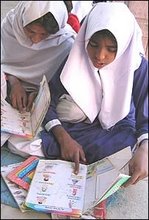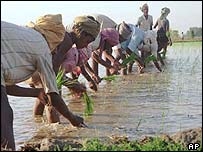PREAMBLE:
The track record of developed countries honoring their aid commitments is not impressive (especially the G8 nations)[1]. However, until recently, there was optimism that most would honor their commitments to support the Millennium Development Goals (MDGs).
To briefly revisit the MDGs for those readers who may not recall what they were about, here is a thumbnail sketch: at a United Nations conference in 2000, governments around the world pronounced the MDGs, to be achieved by 2015. Eight goals were constructed (listed below), reflecting the world's main development challenges and responding to the calls of civil society.[2] Within these goals there are 18 targets, complemented by 48 measurable indicators to measure progress towards the MDGs.
Goal 1: Halve Proportion of People in Extreme Poverty and Hunger
Goal 2: Achieve Universal Primary Education
Goal 3: Promote Gender Equality and Empower Women
Goal 4: Reduce Child Mortality by 2/3
Goal 5: Reduce Maternal Mortality by 3/4
Goal 6: Combat HIV/AIDS, Malaria and other diseases
Goal 7: Ensure Environmental Sustainability
Goal 8: Develop a Global Partnership of Development
Last year’s UN Special Session on MDG outcomes provided an important reminder: in relation to Goal 8 (Develop a Global Partnership of Development) there was a message for all donor countries, namely that, without more reliable support from developed countries, several Goals are likely to be missed in many developing ones.[3]
However there is now serious concern regarding the 6th goal, which comes within the remit of a “Global Fund to fight AIDS, Tuberculosis and Malaria”. Tragically, in November 2011, several European entities (Germany, Ireland, Sweden and the European Commission itself), ostensibly in response to fraud in a small number of developing nations (4 out of >120 recipient countries), have frozen or drastically cut back on their funding support to the Global Fund as a whole with the effect that it will not be able to take on any new commitments for a 3 year period.
Although it is understood around the world that the entire European Union is now under existential threat, and therefore unable to make good on their commitments, in our view it is a “bit rich” (to use the vernacular, no pun intended) that these rich nations, whose own financial mismanagement and fraud in some instances led to their own current morass, feel free to tar recipient countries with the same brush.
The documented fraud amounts to $34 million, which represents 0.03% of the Fund’s whole portfolio, and all of the evidence of fraud that was cited in the press was uncovered by the Fund itself after it undertook investigations. Furthermore, the Fund had publicly announced these findings as they were uncovered. There was never any duplicity or attempts to cover up the losses. It would be interesting indeed to see how this compares with the extent and impact of fraud in the European Community itself, especially on the heels of various banking collapses, and national defaults. Pot calls kettle black?
For this issue of PacificSci Global Perspectives, we extract from an objectively critical situation analysis as presented by Results UK, an NGO registered in England, Wales and Scotland.[4]
NOTE: This is our last issue for 2011. Our Year in Review will appear as the first issue for 2012.
References:
1. White F. Development assistance for health – donor commitment as a critical success factor. Can J Public Health (2011)102,6:421-3
2. United Nations Development Programme. About the MDGs: Basics - What are the Millennium Development Goals? http://www.undp.org/mdg/basics.shtml Accessed December 15, 2011.
3. UN General Assembly. 65th Session Agenda Items 115. Special Session on the MDGs. Outcome Document: New York. September, 2010.
4. Supporting the Global Fund – making the case for immediate intervention. Background Sheet 1: RESULTS – the power to end poverty. December 11, 2011. http://results.org.uk/sites/default/files/December%202011%20Background%20Sheet%201%20Supporting%20the%20Global%20Fund.pdf Accessed December 15, 2011.
THE GLOBAL FUND TO FIGHT AIDS, TB AND MALARIA (GF)
Note: This report is extracted verbatim from the work of Results-UK (citation #4 above). While we fully endorse what they have stated, the originality of this analysis belongs entirely to them. We recognize that it was written for a primarily UK audience, but we feel that it deserves global recognition and readership.
The GF is a multilateral agency founded in 2002 and is the world’s largest financer of anti-AIDS, TB and Malaria programs. It operates as a partnership between governments, civil society, the private sector and affected communities. It draws its funding from donor governments, trusts and foundations and distributes that money to implementing agencies. To ensure that GF money goes to where it is needed most, it prioritises countries with low incomes and high disease burdens. Importantly the GF is guided by the principles of accountability and transparency. It focuses explicitly on results and has an outstanding track record for delivering real impacts on the ground.
At the end of 2010 the GF has approved funding of $22 billion for more than 600 programs in 150 countries. Because it has such clear monitoring mechanisms the Fund states that it has distributed 190 million insecticide treated nets to treat malaria, provided TB treatment for 8.2 million people and provided antiretroviral drugs and holistic care for some 3.2 million people, saving 7.7 million lives.
How funding works: the replenishment process
The fund is predominantly bankrolled by contributions from the governments of developed nations. Since it was created in 2002, 95% of pledges have been from these governments (totalling $28.3bn), with the other 5% coming from private sector and philanthropic givers like the Gates Foundation. From 2001-2010 by far the largest contributor to the fund has been the USA, followed by France, Japan, Germany and the UK. In terms of giving as per cent of GNI, Sweden gives the largest proportion, followed by France, Norway, Holland and Spain.
After the initial funding it received for 2002-2004 the GF has gone through a replenishment cycle every three years, with the last of these events taking place in 2010 in New York. The GF went into the New York conference seeking $20 billion to fully fund the fight against the three diseases. Whilst this represented a doubling of contributions from the 2007 replenishment, it was considered as absolutely vital to avoid losing ground to the diseases. Unfortunately, pledges and projections at the conference only ended up totalling $11.68 billion. The result was that the GF needed to seek new funding, could not fund certain high cost programs and had to slow the pace of scale up.
The UK contribution
The UK government has been a strong historic supporter of the Fund. In 2001 the Labour government made a pledge to give £1.36 billion between 2001-2015 and has delivered £1.06bn thus far. After coming to power the new coalition undertook a review of all UK giving to multilaterals and the Fund came out very well, rated in the highest category as providing ‘Very Good’ value for money, which was only given to 9 organisations. In giving the Global Fund a top score, the Multilateral Aid Review (MAR) found its “quality and depth of reporting” were very high, and reported that “standards for financial management and audit” were very high as well. Overall it found the Global Fund to be critically important in the delivery of the MDGs.
As such, the new government has committed to continued giving to the fund at the same levels as the previous administration. The UK has not made a new pledge recently, however, our historically strong stance puts us ahead of many European countries. Civil society organisations across the UK and Europe have been calling on the UK to make a contribution of £840 million between 2011-2013, a figure that would represent a ‘fair share’ of the $20 billion that the GF requested to fill financing needs of partner countries.
What went wrong?
There have been several competing factors that have led to countries withdrawing or withholding their payments to the Global Fund.
1. The financial crisis: The global economic downturn of 2008 has severely hit the GF. With aid budgets being squeezed more tightly than ever before, many countries have chosen to hold back or renege on their commitments to the Fund, citing a variety of causes. As the crisis has continued the ratio of pledges to money actually delivered has steadily worsened, with countries including Spain, Holland, Denmark, Italy, Belgium and the US seriously behind on their commitments. Countries are finding the crisis a convenient excuse not to meet their commitments.
2. Global Fund Corruption: In January this year, corruption in GF programmes was inaccurately and sensationally reported by the Associated Press. Citing losses of $34 million dollars across several countries, the media created a situation in which Germany, Ireland, the European Commission and Sweden all announced that they were withholding funding until investigations into the causes of the losses and how they occurred were carried out.
3. A victim of its own success: Ironically, the Fund’s success up until 2010 has partly led to these problems. The Fund introduced new paradigms in the global health and international development arenas. It established a mechanism which channels resources to fund demand through the submission of evidence based, technically sound TB/Malaria/HIV proposals, and as a result has regularly met and exceeded its targets. As such, scale up in demand has been steep, leaving the Fund needing increasingly more and more funding. When global economics were good, this was a curve that could continue. Now this is clearly no longer the case.
The issue of corruption
Stories began to circulate in January 2011 about money going missing from GF supported programs in nine different countries. The total sums that were misappropriated or unaccounted for totalled around $34 million dollars. As a reaction, Germany, Ireland, Sweden and the E.C all stated that they were withholding money to support pledges. They all cited slightly different reasons – and had slightly different motivations – but all called for the Fund to conduct an investigation into its activities.
The media reports of corruption have been very damaging to the Fund, but it’s important to look at this in detail and put the figures into perspective. All of the evidence of fraud that was cited in the press was uncovered by the Fund itself after it undertook investigations. Corruption was found in 9 out of 33 investigated programs (of 145 the fund administers). In Mali, the country with the greatest losses, the Fund has reclaimed a large amount of that money and secured the convictions of nine civil servants involved in its theft. The Office of the Inspectorate General (OIG) is a completely independent body within the Fund that carries out these investigations. What’s more, the Fund had publicly announced these findings as they were uncovered. There was never any duplicity or attempts to cover up the losses. Joe Liden, a spokesman for the Fund stated that they felt they had been “treated very badly by the media.”
Within the whole of the Fund’s portfolio, the $34 million represents 0.03% of the Fund’s whole portfolio (although only 33 countries were investigated). However, these 9 programs were investigated for the very reason that they were some of the riskiest grants the Global Fund provided. Looking at the most recent set of reviews from the OIG, which analysed over $1b of grants, indicates that across the whole portfolio, no more than 1% of funds have been lost to fraud. This is substantially less than is lost by the UK’s DWP every year.2 However, the sensationalist language used by the media has stuck and the Fund’s reputation as been damaged. The Fund has been through a process of self-evaluation and produced a High Level panel report discussing the problems it faced around fiscal accountability, auditing and investigation practices and has addressed many of the criticisms made by concerned donors.
OUR COMMENT: The ethics of the European Community need to be called into question. It appears that they have held the Global Fund to a higher standard than they themselves could meet, especially given the evidence of everything from bank fraud to gross mismanagement of national finances in several of their own members (Ireland is one of the countries that have reneged on their GF commitments, but isnt this also one of the so-called “PIGS” that have exhibited financial mismanagement?), leading to the current crisis in the Euro. At least one should expect Europe to be honest about this and not play “bully in the pulpit”. Why not lay the blame for reneging on commitments on their own mismanagement, and by extension accept responsibility for any reversals that will result from funding shortfalls in global efforts to combat these diseases over the next 3 years?
We wish all readers the very best for the Holiday Season, and a Happy New Year.
FROM a Great Canadian and World Statesman
"A great gulf... has... opened between man's material advance and his social and moral progress, a gulf in which he may one day be lost if it is not closed or narrowed..."
Lester B Pearson
http://nobelprize.org/nobel_prizes/peace/laureates/1957/pearson-lecture.html
Thursday, 15 December 2011
Subscribe to:
Comments (Atom)
INSPIRATIONAL WELCOME ............................... from T.S.Eliot's "Little Gidding"
If you came this way From the place you would come from... It would be the same at the end of the journey...
If you came, not knowing what you came for, It would be the same... And what you thought you came for Is only a shell, a husk of meaning... From which the purpose breaks only when it is fulfilled If at all.


























